City of Zagreb Unlawfully Expropriated Land to Build Car Park for Cableway Users
ZAGREB, 17 June 2021 - The City of Zagreb unlawfully dispossessed the owners of a piece of land in the Gračani neighborhood to build a car park for the Sljeme mountain cableway, the Justice and Administration Ministry confirmed to Hina on Thursday.
The Ministry said that on 21 May it had annulled the decision by the city department for property relations and referred the case back to the City for reconsideration after it found that the City had taken possession of the property in question before the expropriation decision became final.
According to media reports, the Ministry granted the appeal filed by a lawyer on behalf of one of the co-owners of the land who died during the expropriation process. The City needed the land to build a car park at the foot of Mount Sljeme to serve cableway users.
While it was still not known who would inherit the property of the deceased co-owner, the City decided of its own accord that would be his wife and daughter. Media say that the wife never received a copy of the expropriation application and that the City ignored the fact that she is infirm and needs a guardian. The City, on the other hand, argued during the appeal process that the whole case was conducted in accordance with the Roads Act and not the Expropriation Act and that the owners had been paid for their land.
For the latest news about Zagreb, click here.
Jadrolinija National Ferry Company Acquires New Ship
17 June 2021 - Jadrolinija national ferry company acquired a new ship that will connect the town of Biograd with Tkon on Pasman island.
"Jadrolinija" is one of the most used words in the Croatian language during the summer, at least on the coast. This national ferry company has been connecting the mainland and the islands of the Croatian part of the Adriatic for decades. Its international lines see it connecting Croatia with Italy for part of the year as well.
Because of the small size of the towns and villages and the scarce population living on the islands, only a portion of these lines are profitable and the fleet is pretty large. It is therefore quite a newsworthy item to see Jadrolinija presenting a new addition. Ferry „Tkon“ joined the fleet that now counts 55 ships in total.
Valuable Addition
It was purchased from Rapska Plovidba (Rab Shipping) as index.hr reports. Tkon is a product of renowned Croatian shipyard Viktor Lenac. It is 42 metres long, 15,3 metres wide, and can hold 250 passengers and 35 cars. It was built in 2003. In comparison, ferry „Prizna“ that serviced this Jadrolinija line so far is over 50 years old. It will be on stand-by for the busiest parts of the year. After the purchase Tkon is heading to the docks for maintenace and re-painting. This is good news for all travellers to Pasman island, but also all the islanders and Biograd locals. Chairman of the board of Jadolinija, David Spota said the move goes along the strategic goal of updating and improving the fleet. This is the fifth new ship to come under Jadrolinija flag in the last four years.
It really is difficult to avoid blue-striped Jadrolinija ships along the Croatian coast. They bring much joy to all those wishing to visit some of over a thousand magical islands of Croatia. Here's to Tkon's smooth sailing!
Follow the latest travel updates and COVID-19 news from Croatia HERE.
For more on travel in Croatia, follow TCN's dedicated page.
Croatian Diaspora in South America: The Story of Nadia from Argentina
June 17, 2021 - Reuniting with your Croatian ancestry can go in many ways. Many of the Croatian diaspora in South America tirelessly seek to trace their roots, and several of them without success. The chances of accidentally meeting your distant relatives are always low, but this is what surprisingly happened to Nadia from Argentina.
Every year, lists are written in media and blogs everywhere to rank Croatian destinations, facts, and people, but I don't know if it has occurred to anyone before that Croatia, in addition to its beaches, its islands, its nature, its Roman, Venetian, Austro-Hungarian, and Yugoslav heritage, its geniuses (both in science and sport) and more, Croatia could also be known for its surprises. It is true that being Croatian, of Croatian descent, or living in Croatia can surprise one on various occasions, and not always in a negative way.
Of course, there are known surprises that one can get when going to the police station to carry out a procedure, or when sitting at the table of a Croatian family at lunch, or after a rakija tasting. But some of its most interesting events happen when reconnecting with your Croatian ancestry. Not only through my own experience, but I know of many, many people over the years who have failed to find out more about their ancestors rather than the simple fact that they were Croats.
As the years go by, it becomes more difficult to connect the evidence that one finds to solve numerous questions such as the year their ancestor was born, where they were born, when did they leave Croatia, why did they leave Croatia, what did they do while living there, what did they do after arriving at their new country, and so on. This is very difficult to solve, especially for the large Croatian diaspora in South America, a distant continent in so many ways beyond what’s measurable. If there’s something I know, it is that one of the decisions that can facilitate this search is to return to the mother country. It is not a guarantee, but it can definitely bring you closer to the answer you are looking for.
But what if one is not looking for it? It does not mean that there is no type of interest, but precisely it ceases to be a priority when it becomes so difficult to know something about our origins. When you find something you were looking for, it always brings a pleasant sense of success and fulfillment. But when it is unexpected, the feeling of joy can be equal or even greater. This is what I thought when I first heard about Nadia's experience. But I feel like the story will feel more magical if it is shared through her own words. Meet Nadia Milevčić, a returnee from Argentina.
What country are you from and when were you born?
I am from Argentina, I was born in Buenos Aires in October 1994.
When did you know that you were of Croatian descent?
I can't give you an exact date because it's something I've known for as long as I can remember. Perhaps because of my last name, the fact of being of Croatian descent was always something very present. My dad's four grandparents were Croatians and he talks a lot about them and the things they taught him. My grandmother, daughter of Croats, used to speak to me in Croatian when my brother and I were young. She also told me about our family, about the city of Split in Dalmacija, and about the history of Croatia as a country. For all these things, the Croatian heritage was very important in my family.
When did you decide to travel to Croatia and what motivated you?
In 2018 I started thinking about studying abroad because I wanted to have the experience of living in a totally different environment from mine. First I thought that this trip would be related to something in my career. At that time I had two years left to finish my Bachelor of Arts degree and I looked for some scholarships in other countries, but nothing appeared.
I started thinking about studying in Croatia when I went to the Buenos Aires embassy to find out how to begin the process of Croatian nationality and the woman who worked there told me about the Croaticum program. It seemed to me that the idea united my desire to live in a totally new place and also my desire to finally know that country that I had been told so much about. In March of that year, I began to work on my project and began to study Croatian in Buenos Aires while waiting for the opening of the call for the scholarship program. That year I applied but did not win. It was very disappointing, but later I understood that it was not yet my time to leave Argentina. In 2018 I also finished the annual Croatian course and continued to search for papers that could help me to prove my Croatian ancestry more clearly.
In 2019, the last year of my degree, I applied for the scholarship again and won it. That same year, a distant cousin of mine contacted me from Croatia saying that we were family. At that time my idea was not only to get to know the country of my great-grandparents and live in it for a while but also to reestablish the bond with the rest of my family in Croatia, of whom I did not know any of them.
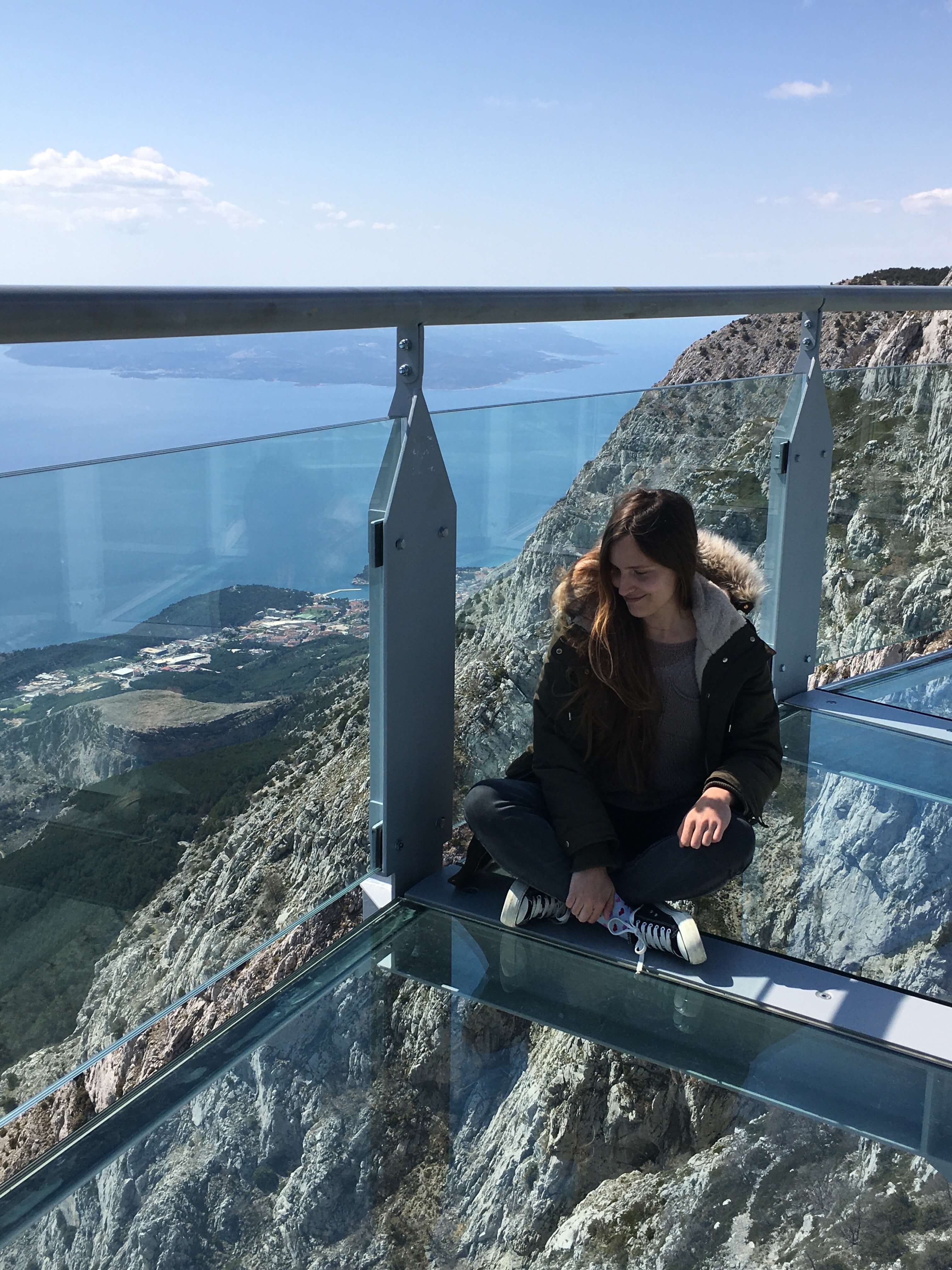
Nadia on the popular Biokovo Skywalk, the same day she met her distant Croatian relatives. (Personal album)
What was your impression when you first arrived?
My first impression of Croatia was that everything was very beautiful and that the people were very friendly. When I met my cousins they seemed to me to be very open and very loving people. The first month I was delighted with everything I saw, it seemed to me that everything was very organized and I felt very safe.
How did that impression evolve over time?
After living here for a year and having moved several times, I also began to see the negative side. All countries have something good and something bad, it is normal. There are things that I don't like and I think that's part of living in the reality of a country and getting out of that stage of infatuation in which I was at the beginning. Now I have a more realistic impression.
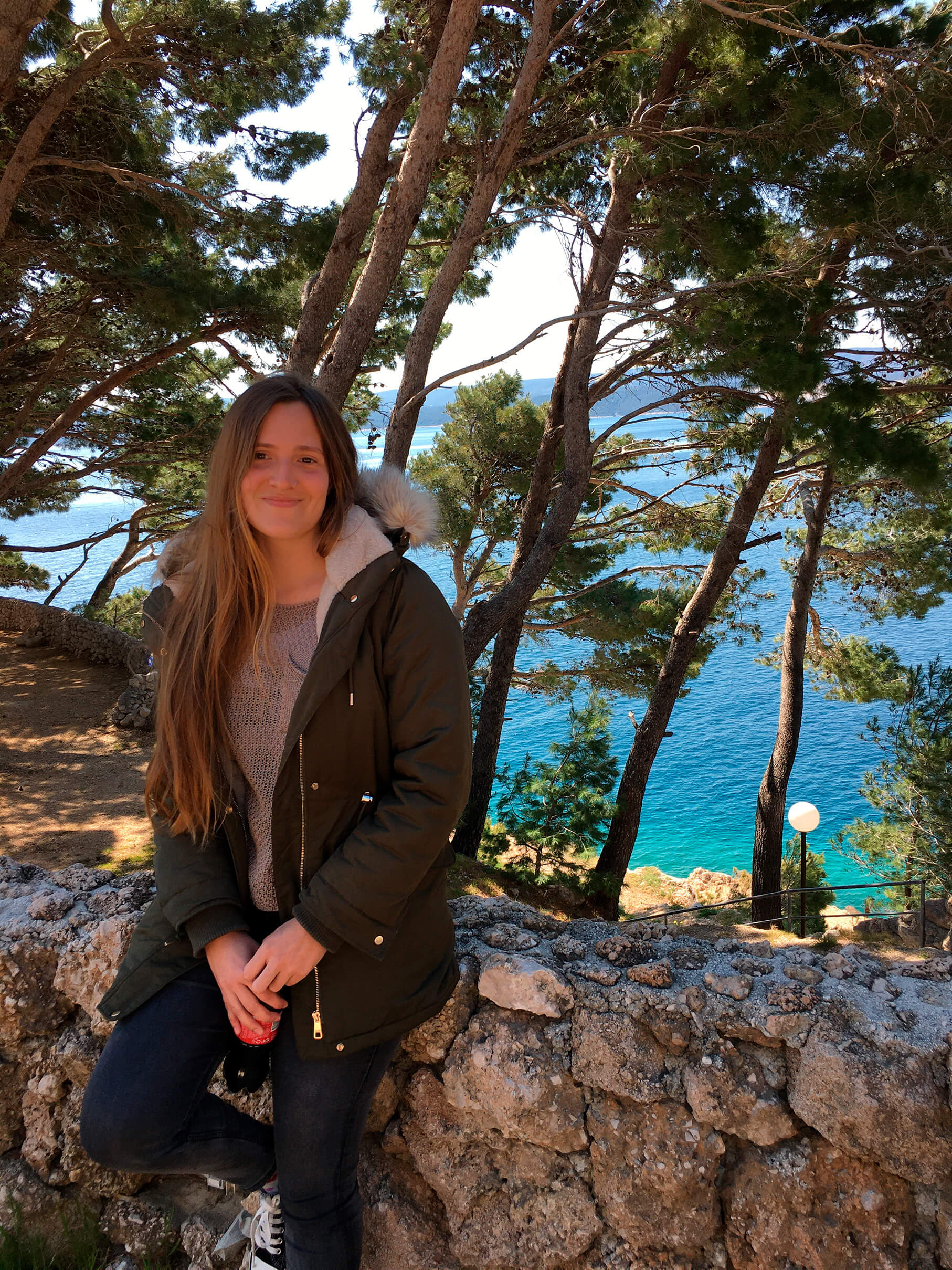
Nadia was born in Buenos Aires, Argentina, in 1994. All of her grandparents are Croatian. (Personal album)
What did you know about your relatives in Croatia?
It was always quite a complicated story because all of my dad's grandparents are Croatian and most of them had a very large family. I know a lot about my great-grandmother Ermenegilda Stanić because they were like twelve siblings and my grandmother went to Argentina because my great-great-grandfather arranged her marriage to a rancher so that she would have a good future in financial terms. When she arrived in Argentina she fell in love with my great-grandfather Duje Runje, a Croatian who worked as a laborer in that ranch. Obviously, it was something very strong for all of his family and my dad always talked to me about the two of them. He doesn't have much information about his paternal great-grandparents because my grandfather, Spiro Milevcic, died when my dad was four years old.
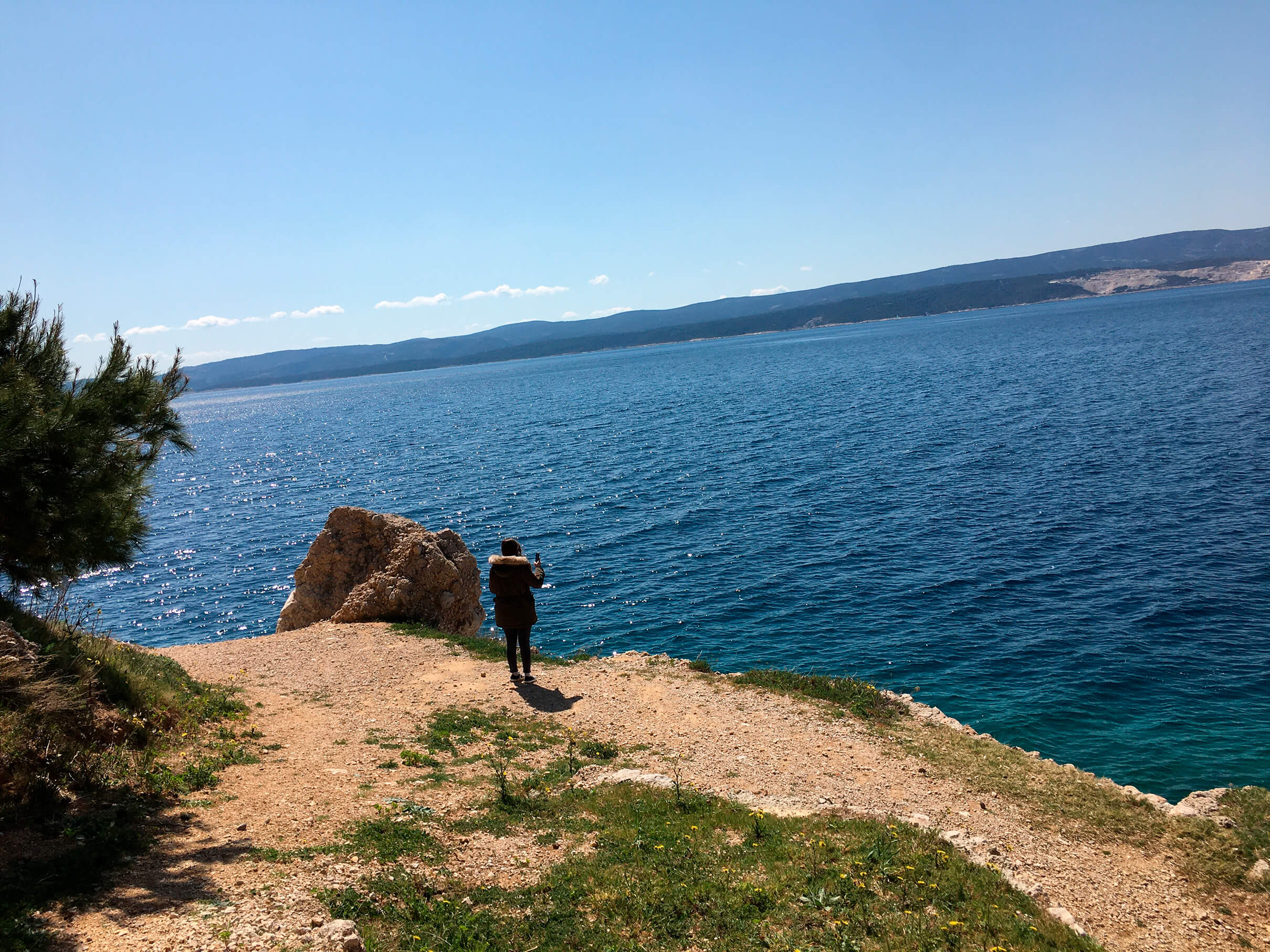
Nadia, who was living and working in Rijeka at the time, decided to travel to Dalmatia for vacation. She hadn't planned to find out about her family on the trip. (Personal album).
Did you have any expectations or plans to meet them?
Yes, my dad has a book that the Stanić family wrote about the descent of the twelve siblings. All the names appear there, including mine. The whole family has it and thanks to that my cousin contacted me from Croatia. It was just the same year that I won the scholarship. She told me that she lived in Rijeka and thanks to that I chose this city as the place where I was going to study for the Croatian language scholarship. This is how I met the descendants of one of the Stanić brothers, but I also knew that she had much more family in Croatia. Last year I didn't meet anyone else because most of them live in Dalmacija.
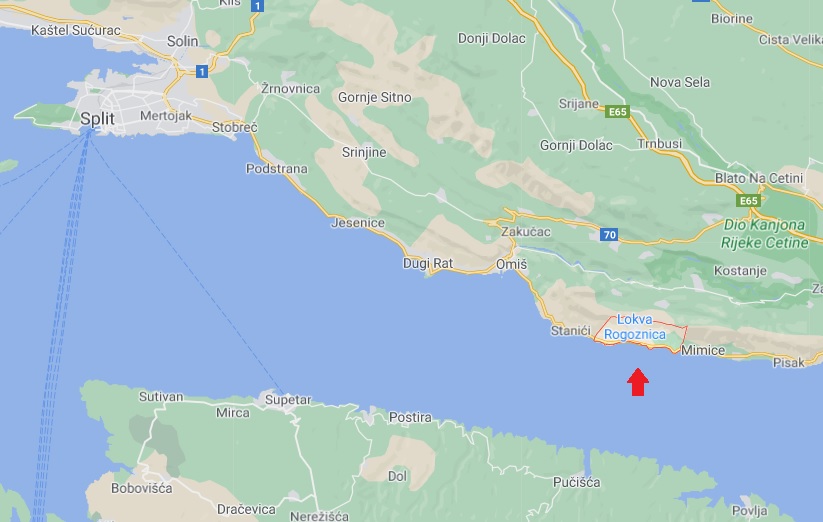
Lokva Rogoznica is a Dalmatian town, one hour away south of Split and 10 minutes away from Omiš. (Google Maps)
The day you met your distant relative, what were you doing and where?
Last month I went on vacation to Split and decided to go to Lokva Rogoznica, a town about an hour away because my great-grandmother was born there. My dad and my Croatian cousins had asked me to go meet him, but it was not my plan to look for anyone there, just take a couple of photos and see what the place was like.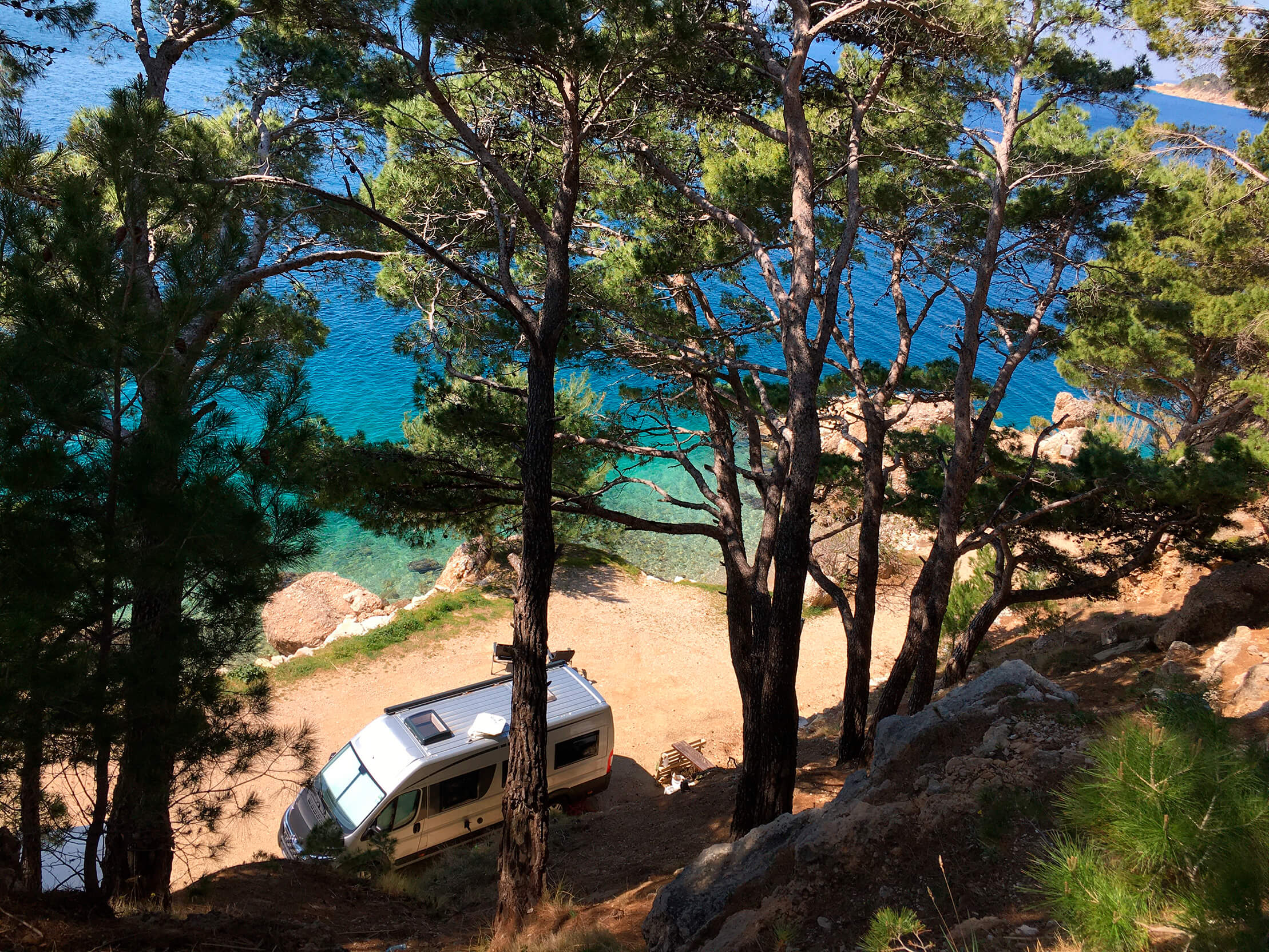
''La Sirena'' autokamp, in Lokva Rogoznica, the town where Nadia's family originated. (Personal album).
How was the encounter?
We stopped at a sign on the route to take a picture of me and we wanted to go down to the beach. I saw that there was a sign for an autokamp and that the beach was private. I remembered my cousins telling me that one of the Stanić was the owner of a campsite somewhere in Dalmacija, but I didn't know where. When we were about to go down to the beach, the owner of the campsite appeared and told me that the beach was private and that we couldn't enter. I don't know why it occurred to me that this could be my relative and I asked him if his last name was Stanić. He said yes and at that moment I told him that we were family because I was Ermenegilda's great-granddaughter. At that moment his face changed completely and he asked me if my great-grandmother had traveled to Argentina. When I said yes, he came closer to me and gave me a hug, and introduced himself as Milan Stanić.
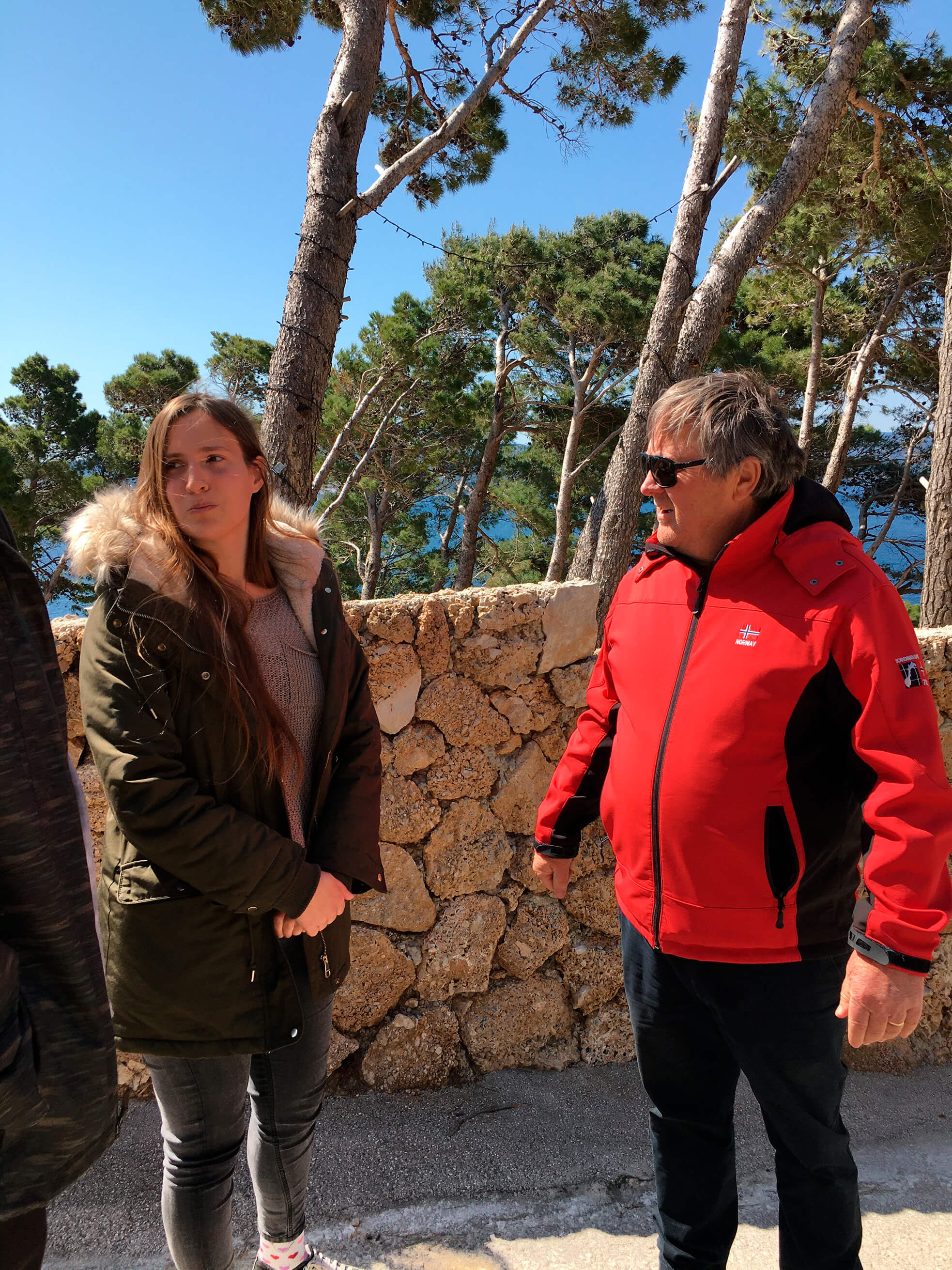
Nadia, soon after she met her distant relative, Milan Stanić. (Personal album)
How did you feel when the last names matched?
I felt very good and very strange at the same time. I was thinking of my dad because his desire was always to meet his Croatian family. I was the first person in my family to return to Croatia and from the first moment, I felt that it was my task to re-establish the bond with the other descendants. I also thought that I had come to take a photo and I ended up leaving with one more piece of my family. I like to think that it was something that had to happen and that it was time for us to meet.
What was his reaction when he found out?
He was very excited and very happy. From the first moment, he was very open with me and he introduced me to all of his family. That day we had lunch and dinner together. It was a very nice moment because all his daughters and his wife welcomed me very well and everyone was interested in talking to me.
Are you still in touch with him?
We don't talk every day, but I have his number and my cousin’s Facebook, so I can let them know the day I'm going to visit them again. They know that I am living in Rijeka and that I am working, but that at the end of the summer I am going to travel with my brother so that he can meet them too.
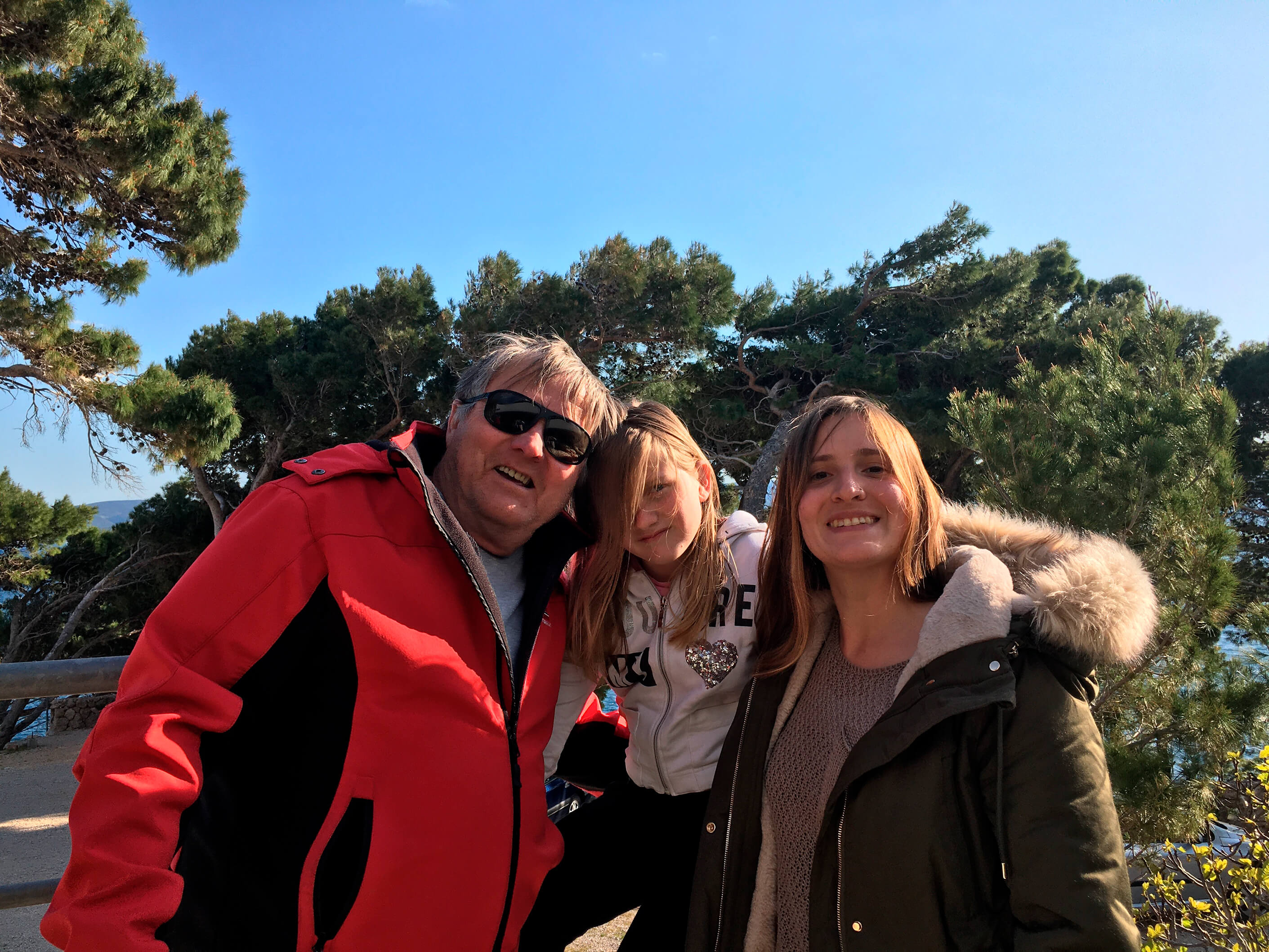
Milan, his daughter, and Nadia. (Personal album)
What is your goal in Croatia? Would you like to stay?
My idea of Croatia totally changed over time. When I arrived I planned to stay for only four months to study, but then I applied again for a second semester. I think that the decision to reapply for the scholarship was no longer motivated by the desire to know another culture, but was related to the fact that I felt good in Croatia and that I still did not want to go back to Argentina. Nowadays I am more established with the Croatian language and culture, but I cannot tell you that I want to stay permanently. I feel a strong connection to Croatia, but I also have my best friends and family in Argentina. Every day I miss my country and the people who live there and that is why I know that I will return to my country at some point. I sincerely feel that one half is here and another half is there in Argentina and for that reason, I would like to go and come back, spend some time in each country. I think it is a decision that is made every day. I can only tell you that today I choose to stay here.
The Croatian diaspora in South America is one of the largest in the world, and we at Total Croatia and Total Croatia News are committed to developing more on the subject in the coming months. If you belong to the Croatian diaspora in South America and want to share with us a story of reuniting with your distant relatives or your experience living in the land of your ancestors, you can send an email to This email address is being protected from spambots. You need JavaScript enabled to view it..
For more about the Croatian diaspora in South America, visit our dedicated page here.
Croatia Moves Upward by One Position on IMD World Competitiveness Ranking
ZAGREB, 17 June 2021 - Croatia ranks 59th on the latest IMD World Competitiveness Ranking that covers 64 economies in the world.
The IMD World Competitiveness Ranking measures the capacity and readiness of economies to manage their competencies to achieve long-term growth, generate jobs and increase welfare.
This year, Croatia has moved upward by one place after, in 2020, the ranking covered 63 economies.
In the last five years, Croatia's annual positions on this ranking ranged between 59th and 61st place.
The latest ranking from the Lausanne-based IMD World Competitiveness Center (WCC) positions Switzerland and Sweden in the first and second place respectively.
The ranking is based on 334 criteria, of which two-thirds are statistical data, and one-third are based on the opinion of businesspeople polled for this purpose.
Considering 20 competitiveness indices, Croatia fares well in international trade (29th place), price level, health and environment, and education.
Croatia, for instance, fares poorly in management practices, labor market, business legislation, and some other criteria.
In comparison to all the EU members, Croatia is at the lowest position.
The president of the National Competitiveness Council, Ivica Mudrinić was quoted as saying that the EU funding available to Croatia could help the country to speed up highly-anticipated structural reforms.
For more about business in Croatia, follow TCN's dedicated page.
A Guide To A Positive Tourist Experience in Croatia
June 17th, 2021 - 2020 has been a difficult year for Croatia as the country mostly depends on tourism. With the borders opening and travel returning to normal, it's important to remain respectful to the people and the environment you're in, no matter the place. Here is a guide to a positive tourist experience in Croatia just in time for the summer season.
1. Learn basic words
Many Croatians speak English, especially those in the tourism industry, but it's always a nice gesture to learn a few basic words. Simple words such as "hvala" (thank you," "kako si?" (how are you?) can go a long way and make Croatians feel really special. Also, it's pretty cool to be able to say you know some basic Croatian! It can't be that hard to leave a few unique words which can completely change your experience while on your holiday!
2. Clean up after yourself
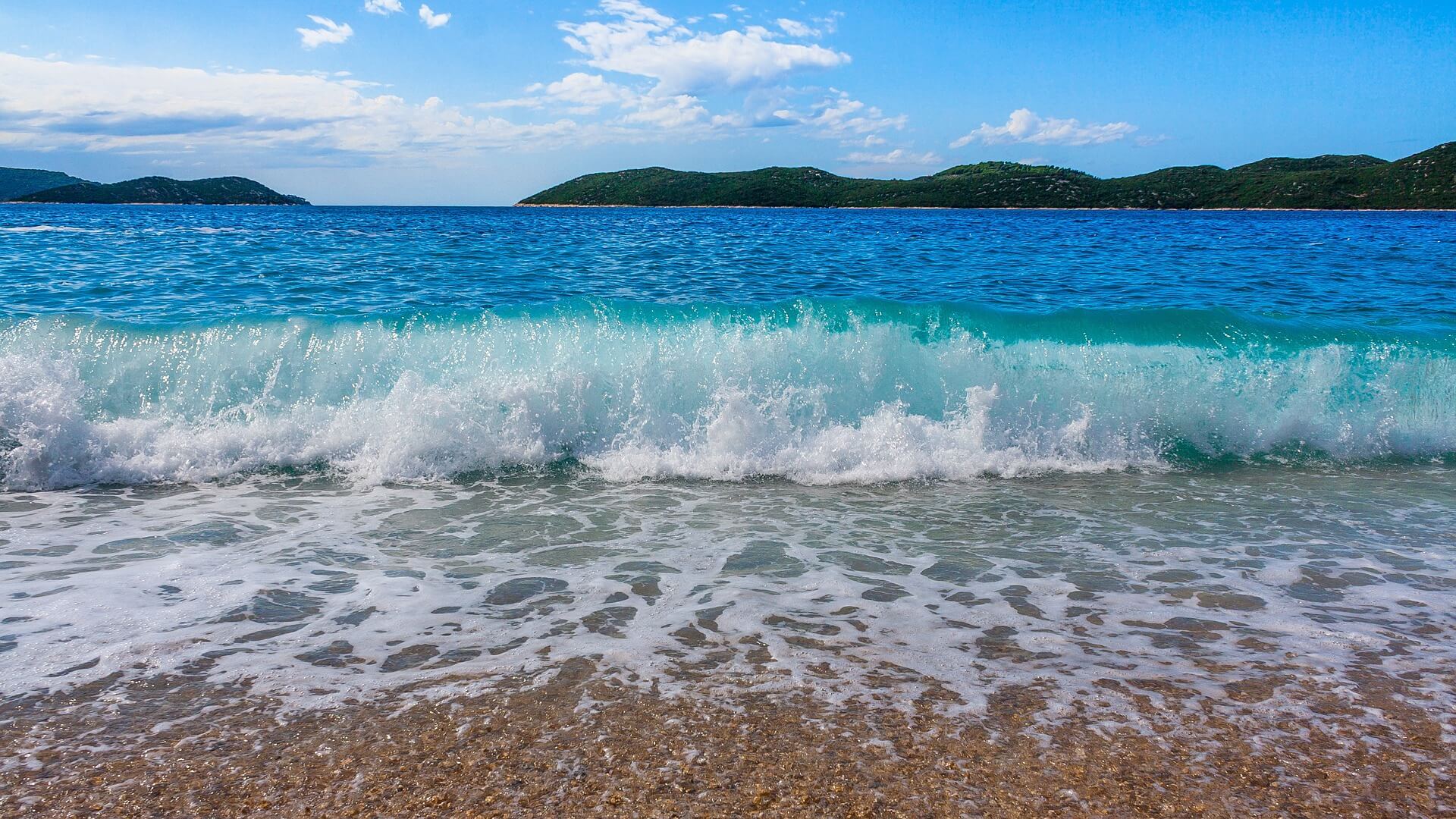
Pixabay
Croatia prides itself on keeping its beaches pristinely clear, but it's not always possible as a tourist destination. Remember that you're a visitor to our beautiful country, and be mindful of that. While not everyone does their job cleaning up trash, every town, city, and island is packed with trash cans for your convenience. Those beaches, unfortunately, don't clean up themselves and if you'd like to return to crystal clear water and a pristine beach, do your part!
3. Avoid political discussions
Croatia's history is long, complicated, and recent. The last occurred only 26 years ago, which many tourists aren't aware of. If you aren't aware of the history, avoid getting into the discussion because Croatians are very passionate. Remember that your knowledge of history is completely different from those who lived through it. Do your best to avoid the topic or listen to gather knowledge of the situation if it comes up.
4. Double check the currency before paying
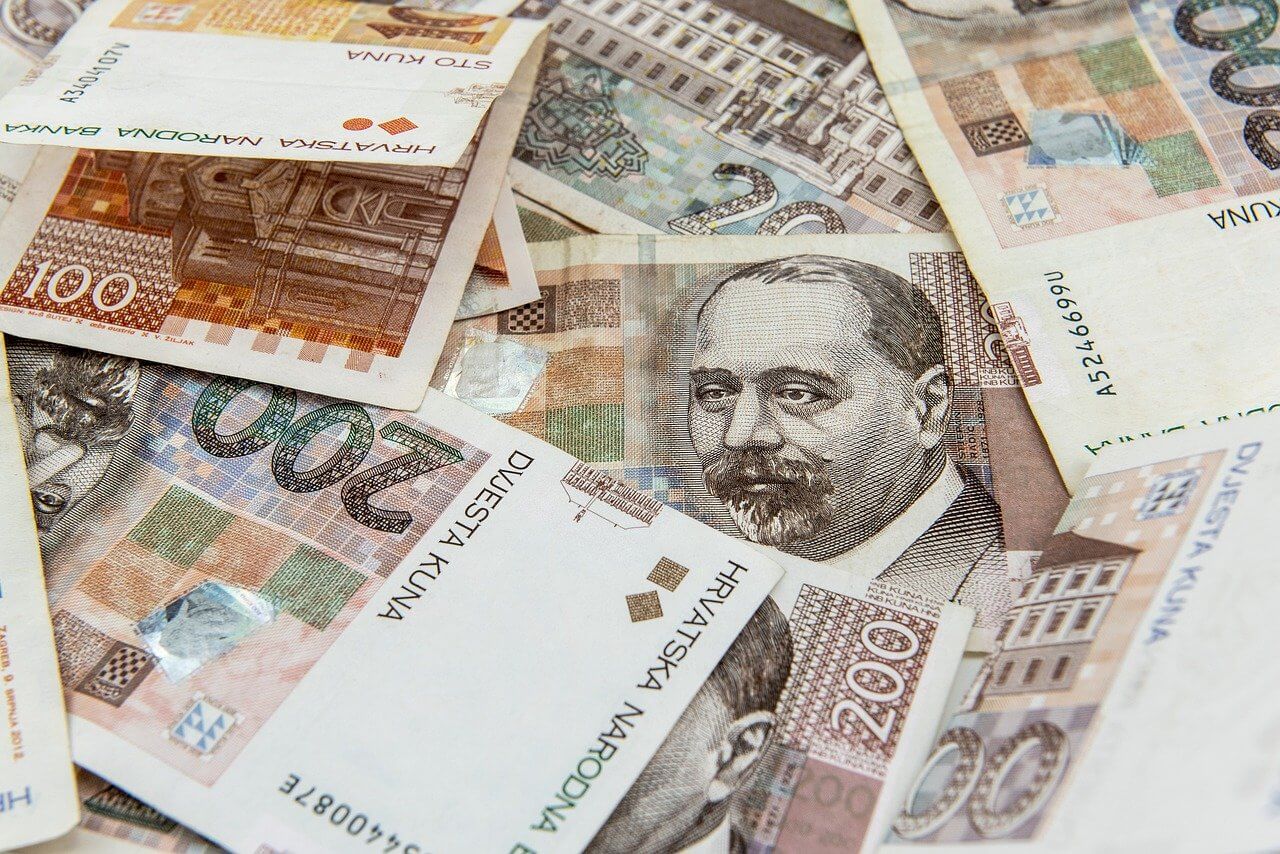
Pixabay
Very often, tourists assume you can pay with Euros anywhere in the country, and while this is mainly true, many businesses in Croatia are family-owned. They may accept Euros but not coins because even though we are a part of the European Union, our currency remains the Croatian Kuna. At times it might be much easier to pay in the local currency, and there are many ATMs and exchange offices all around the country.
5. Be open to new experiences
Much like any other destination, there is more to Croatia beyond the mainstream tourism locations. If you're in Dubrovnik, explore beyond the walls. If you're in Split and Zagreb, there is so much more out there outside the city center. Croatians are more than sharing the beauty of their country with tourists, and a lot of it remains unnoticed by foreigners. Be open to new experiences, such as exploring and trying out things outside of your comfort bubble!
6. Be respectful
We get it; you're on holiday in a beautiful country, but try to be mindful of the local people. Respect the historical monuments, the environment you're in, and the locals. Don't overcrowd historic places everyone wants to enjoy or block narrow streets in Split, Dubrovnik, or islands. The city does not belong to you at the end of the day, but it is thrilled to have you.
For more information about currency in Croatia, click HERE.
Follow the latest travel updates and COVID-19 news from Croatia HERE.
For more on travel in Croatia, follow TCN's dedicated page.
Eggs and Milk Producers to Receive 130 Million Kuna More From EU - Jutarnji List
ZAGREB, 17 June 2021 - Croatia will finally start using EU funding from the Animal Welfare measure, which will be increased by HRK 130 million this year, the Jutarnji List daily said on Thursday.
In 2021 HRK 220 million will be paid to 1,700 users, and in 2020 HRK 90 million was disbursed.
The measure has been used for years by Croatia's competing countries, and it is an additional source of income to many meat, milk, and eggs producers, whom it helped overcome numerous crises and problems.
Following negotiations with the European Commission, it was agreed to increase the average support for welfare in cattle breeding by 187%, in pig breeding by 235%, in poultry breeding by 188%, in goat breeding by 125%, and in sheep breeding by 127%.
In addition, a new HRK 92 million operations for encouraging the use of livestock manure on arable land was negotiated. It was approved because of the devastating data on humus content in our soil due to intensive field production, and it is expected that support will amount to €215 per hectare.
President of the Croatiastočar association, Branko Bobetić, said that the new measures for this your would enable a larger number of applications, adding that farmers could get €10 to €250 per head.
(€1 = HRK 7. 484807)
For more about business in Croatia, follow TCN's dedicated page.
Anušić Promises Continued Financial and Political Support to Serbia Croats
ZAGREB, 17 June 2021 - Osijek-Baranja County Prefect Ivan Anušić promised the continuation of Croatia's financial and political support to compatriots in Serbia, during his visit to the village of Bački Monoštor in northern Serbia on Wednesday.
The leaders of ethnic Croats, who received Anušić, said Croatia's help was key for the Croatian minority, the Vojvodina newspaper "Hrvatska Riječ" said on Wednesday.
Anušić and his associates visited the Monoštor parish house which will become with support from Croatia a place for gathering and promoting the culture and tradition of local Šokci gathered around the association Bodrog.
The county prefect said it was their duty to help their countrymen in Serbia, which Osijek-Baranja County has been doing for years.
"We are always ready to do that. Not only help financially but also stand behind you politically. Specifically, when we are talking about the Monoštor parish house, we will allocate additional funds for that project. You can count on us," Anušić said during a meeting with representatives of the Croatian community.
He said that ethnic communities in Croatia were getting support, so Serbia should also do that for their minorities and get more involved in the projects of Croats.
"Until that happens, we will, not only Osijek-Baranja County but also other counties in Croatia, help the projects of the Croatian National Council (HNV)," said Anušić, as carried by Hrvatska Riječ.
He said a meeting would be organized in Osijek to determine cross-border cooperation projects financed by the European Union, which are of interest to both Osijek-Baranja County and Croats in Serbia.
The support from Osijek-Baranja County is equivalent to the funds the HNV received from Serbia's budget, said HNV president Jasna Vojnić.
"Over the past four years, Osijek-Baranja County has provided €100,000, which is a fifth of the HNV's total budget and which how much the Republic of Serbia gives us," she said.
For more about politics in Croatia, follow TCN's dedicated page.
Croatia's Coronavirus Update: 95 New Cases, Three Deaths, 148 Recoveries
ZAGREB, 17 June 2021 - In the last 24 hours, of 5,192 tests performed for coronavirus in Croatia, 95 (1.8%) have returned positive, the country's COVID-19 crisis management team reported on Thursday.
The COVID-related death toll has increased by three to 8,165.
There are currently 745 active cases, and 342 of them are hospitalized patients, including 25 placed on ventilators. As many as 4,344 are self-isolating.
Since the first registered case of the infection with this novel virus in Croatia on 25 February 2020, 2,097,393 people have been tested, and 358,918 of them have contracted the virus. To date 350,008 have recovered, including 148 recoveries in the last 24 hours.
To date, 1,428,340 people have been given at least one shot against this novel virus, and 790,856 have fully been inoculated.
For all you need to know about coronavirus specific to Croatia, including travel, border, and quarantine rules, as well as the locations of vaccination points and testing centres up and down the country, make sure to bookmark our dedicated COVID-19 section and select your preferred language.
Croatian Scientists Answer Big Question in Cell Biology
June 1, 2021 - Croatian Scientists from one of the most prominent scientific institutse in Croatia, the Ruđer Bošković Insitute (IRB), answered a big question in cell biology regarding the spindle and cell division that has puzzled scientists for decades.
Croatian scientists from the Ruđer Bošković Science Institute (IRB), more precisely, dr. Kruno Vukušić, Ph.D. students Ivana Ponjavić, Patrik Risteski, and Renata Buđa, lead by professor Iva Tolić, researched and have now answered one of the key questions in cell biology.
When it comes to this field of biology specialised in observing and researching cells that make organisms, the spindle is a structure of eukaryotic cells that form during cell division, which is crucial for organisms (including humans, of course) for growth, repair, and reproduction. The spindle is in charge of the distribution of genetic material, but the exact process and molecular mechanisms of that task has baffled scientists for decades.
The aforementioned IRB scientists had their paper published in a prestigious scientific journal, Developmental Cell: Microtubule-sliding modules based on kinesins EG5 and PRC1-dependent KIF4A drive human spindle elongation. The paper described a precise molecular mechanism of molecular microtubule sliding.
''Given that this is one of the key steps in cell division that happens in almost every organism, a molecular mechanism that expands the spindle was the object of interest of many pieces of research. Even though the last 20 years has seen significant progress in understanding these molecular mechanisms, the identity of the protein needed to expand the spindle remained unknown. The importance of the spindle in human cells is apparent, in the fact that besides being the key trigger of moving chromosomes, it encourages the correct segregation of those chromosomes which, if defected, correlate with cancer,'' they said from the IRB in a press release.
This IRB research showed that the proteins KIF11 and KIF4A are the key proteins that stop the expansion of the spindle. This breakthrough was achieved by ''silencing'' several of the many proteins that participate in the process since the previous methods of silencing proteins one by one didn't offer any new knowledge in understanding this process.
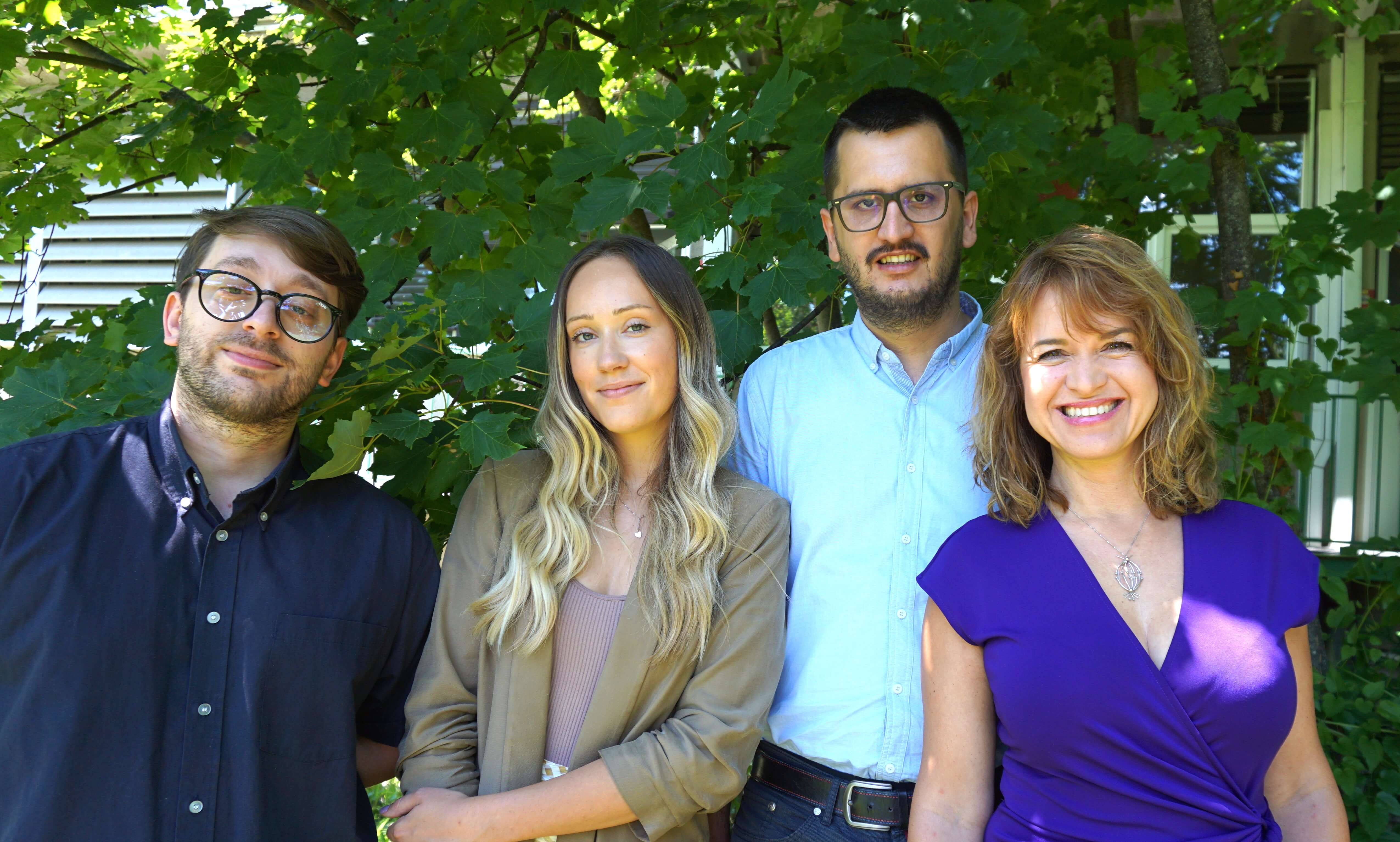
Risteski, Ponjavić, Vukušić and Tolić © Ruđer Bošković Institute
''We hope that the results of this paper will encourage more new research on the role of expanding the spindle in the final stages of cell division. The results we presented are the start of explaining the control mechanisms of this protein, the work of which is under the strict control of many other factors within the cell itself. In addition, the principle of common work we described in this paper could help scientists in determining molecular mechanisms in other processes that are important in cells,'' elaborated the research leader, professor Iva Tolić.
Learn more about Croatian inventions & discoveries: from Tesla to Rimac on our TC page.
For more about science in Croatia, follow TCN's dedicated page.
Meet Saad Al Sulaibi, Croatia's First Digital Nomad Permit Holder from Middle East
June 17, 2021 - Croatia has its first official digital nomad from the Middle East. Meet Saad Al Sulaibi from Jordan, owner of a 12-month Croatian digital nomad permit.
1. You are the first person from the Middle East to get the Croatian digital nomad permit. Congratulations! Tell us firstly about yourself, and how your interest in Croatia started?
Thank you so much, my name is Saad Al Sulaibi, from Jordan. I am an account manager for a US-based company, and I work remotely from home in Amman. Through a group of friends I met a Croatian guy who lived in Amman for three years. During that time, he always used to tell me about and show me pictures of Croatia, and especially his home town, Split. This made me curious to read more about Croatia. While researching, I found an article talking about the Digital Nomad Visa. I found this an interesting opportunity and decided to apply.
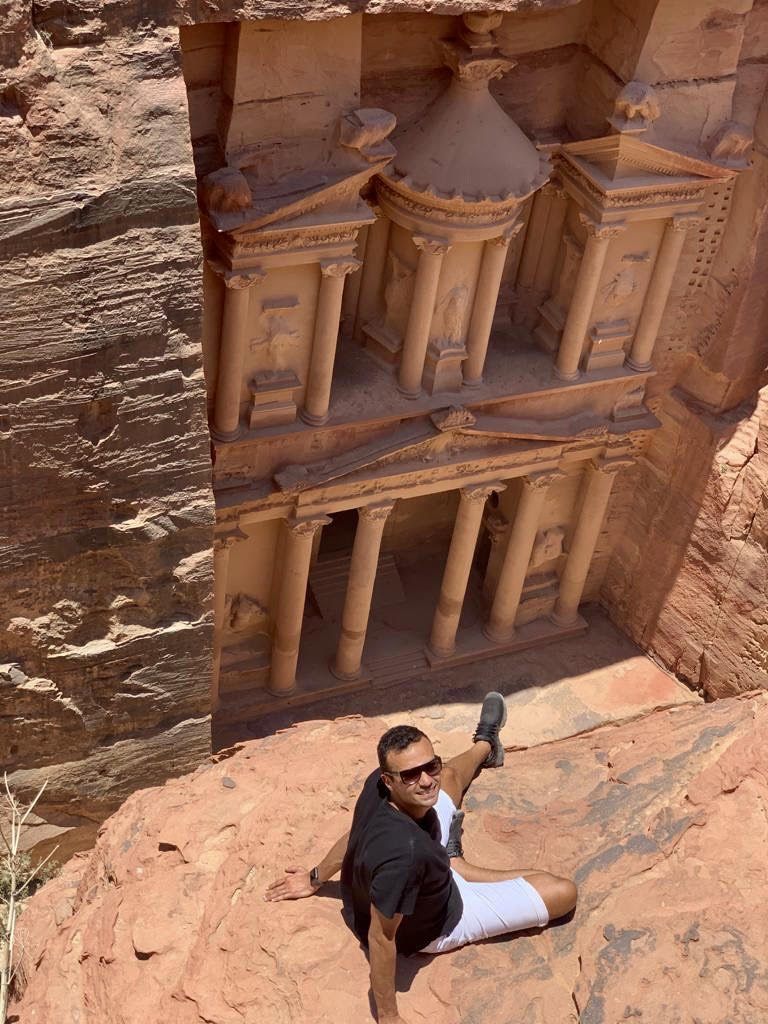
2. We do not have so many Jordanian tourists. Do you think Croatia could be a good destinations for them? What are Croatian tourism's best selling points to the Middle Eastern market?
Definitely. Croatia is a good destination for Jordanians and other Middle Eastern countries. As in large parts of Jordan, Croatia boasts of ancient cities and historic ruins and is full of stunning natural attractions. It also has great a Mediterranean lifestyle with a very affordable standard of living.
3. Why did you decide to apply for the digital nomad permit?
When I read about Croatia and the Digital Nomad Visa option, I asked myself - why not? Croatia has beautiful and very green nature, amazing food and wine, nightlife, is affordable to live in, has good healthcare, a great internet connection for work, and there is no need to pay income tax in Croatia while I am working from there.
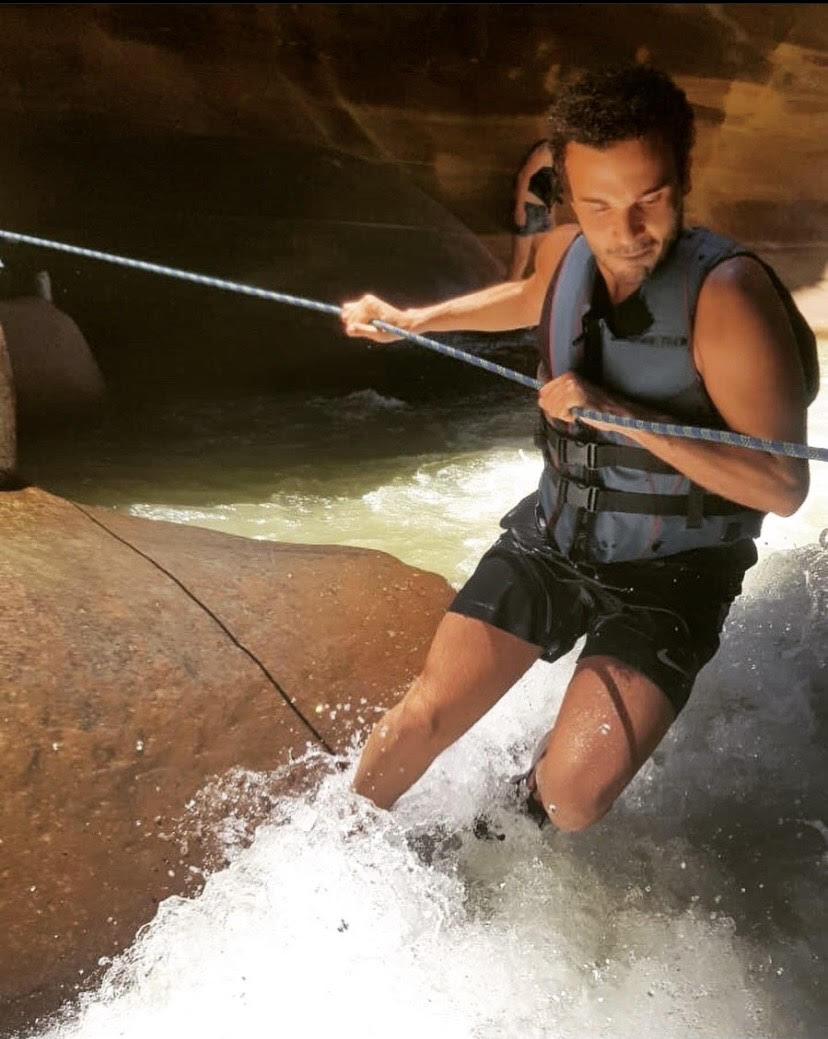
4. There is lots of interest in the permit, but not so much information from successful applicants. Can you tell us in some detail how long the application took, what was involved, how much it cost, and any problems you had?
The application took from 1 - 2 months to get approved, and it cost me around 55 USD. The biggest challenge was not having a Croatian embassy in Amman. As a result, I had to ship my application and other documents to the Croation embassy in Cairo. Also it worth mentioning the daily effort that Ministry of Interior in Croatia to make this application approved.
5. Now that you have a 12-month permit to stay in Croatia, what are your plans?
The plan for now is to Stay in Split to meet with my friend, then to Zagreb then to Krk, Hvar, Dugi Otok, Brač, Vis, Rab, Korčula, Šipan.
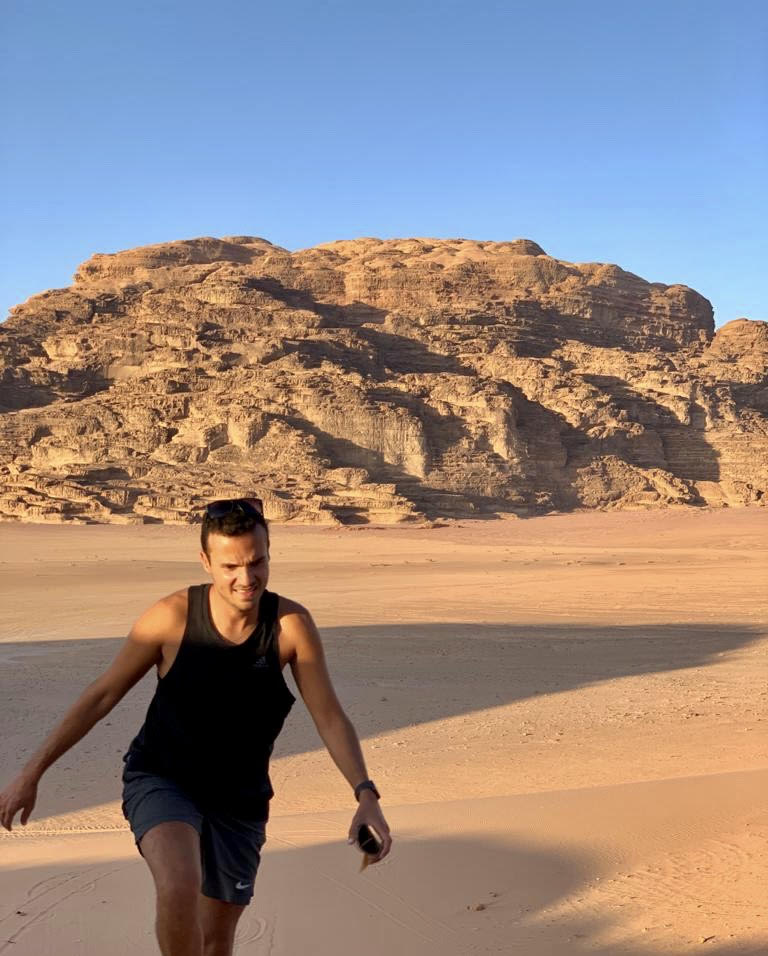
6. In your opinion, what makes Croatia a great nomad destination, and what does it need to do better?
Again, Croatia is one the best places to live in for the reasons I mentioned before. What needs to be improved is marketing Croatia in Jordan and the Middle East.
I would like to use this chance to introduce Jordan to my second family, Croatians. Jordan is great destination to visit, we have many historical places to visit like Petra, Roman theaters, Amman citadel and many others. Also we have a religious sites to be visited like Al-Maghtas where Jesus was baptized by John the Baptist, Mount Nebo where Moses looked on to the Promised Land, Umm ar-Rasas a fortified Roman garrison that contains 16 Byzantine churches, Madaba that holds the Madaba Map which is the oldest mosaic map of the Holy Land.
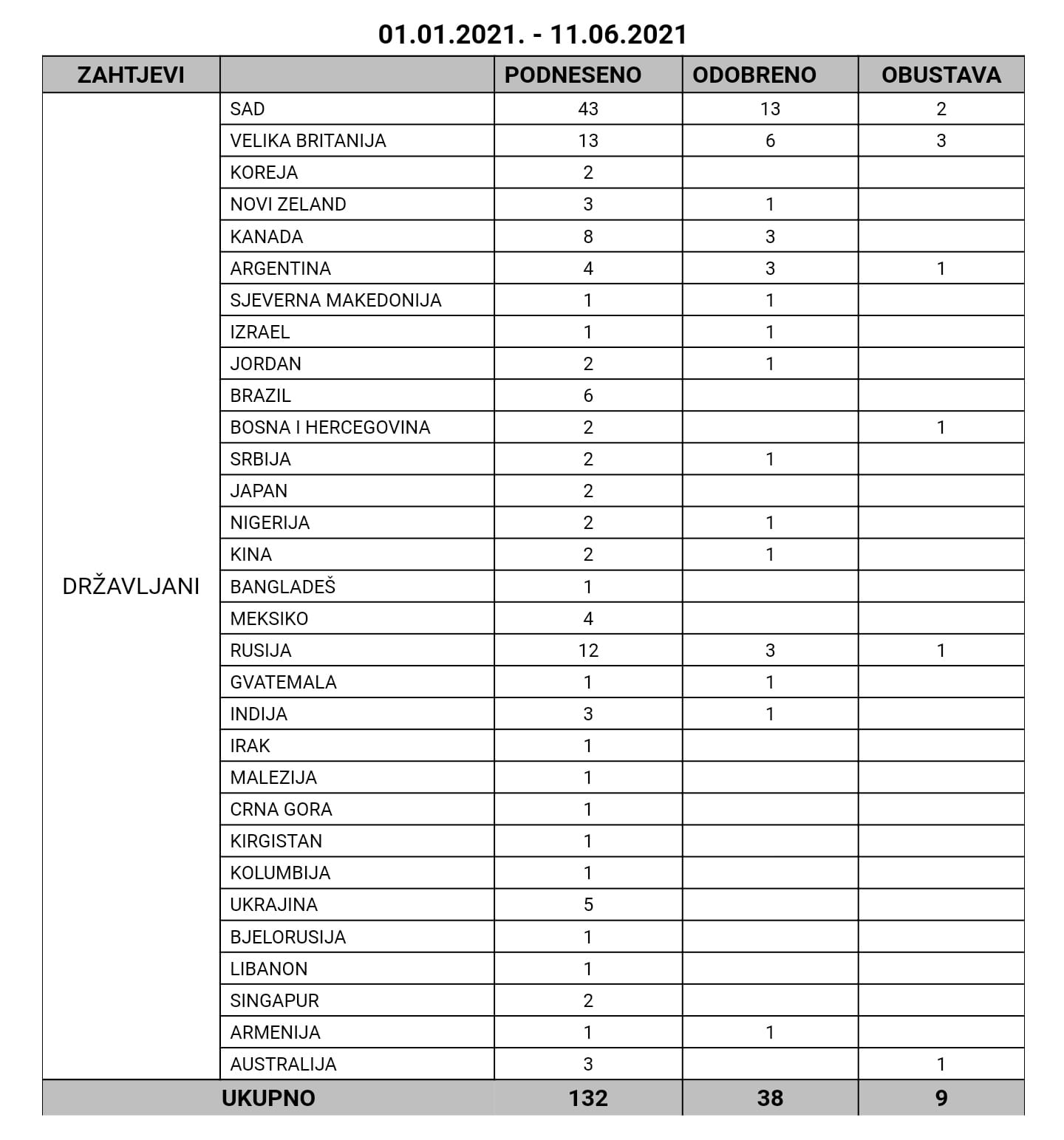
The latest statistics on the Croatian digital nomad permit. 132 applications so far (12 in the last week), with 38 permits granted, and 85 in process.
For the latest news and features on digital nomads in Croatia, follow the dedicated TCN section.
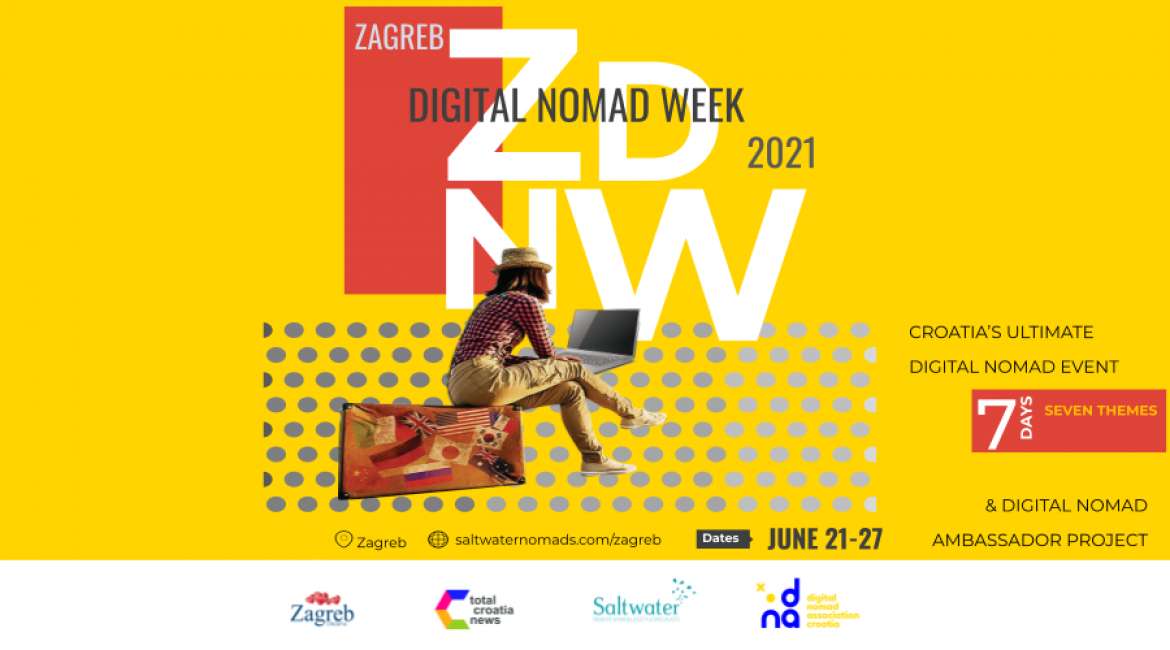
Are you a digital nomad considering the switch to Croatia? Why not join us online or in person at Zagreb Digital Nomad Week 2021, which starts on Monday?
Or be a Zagreb Digital Nomad Ambassdor with a free month of accommodation from July to December, as a guest of the city.


